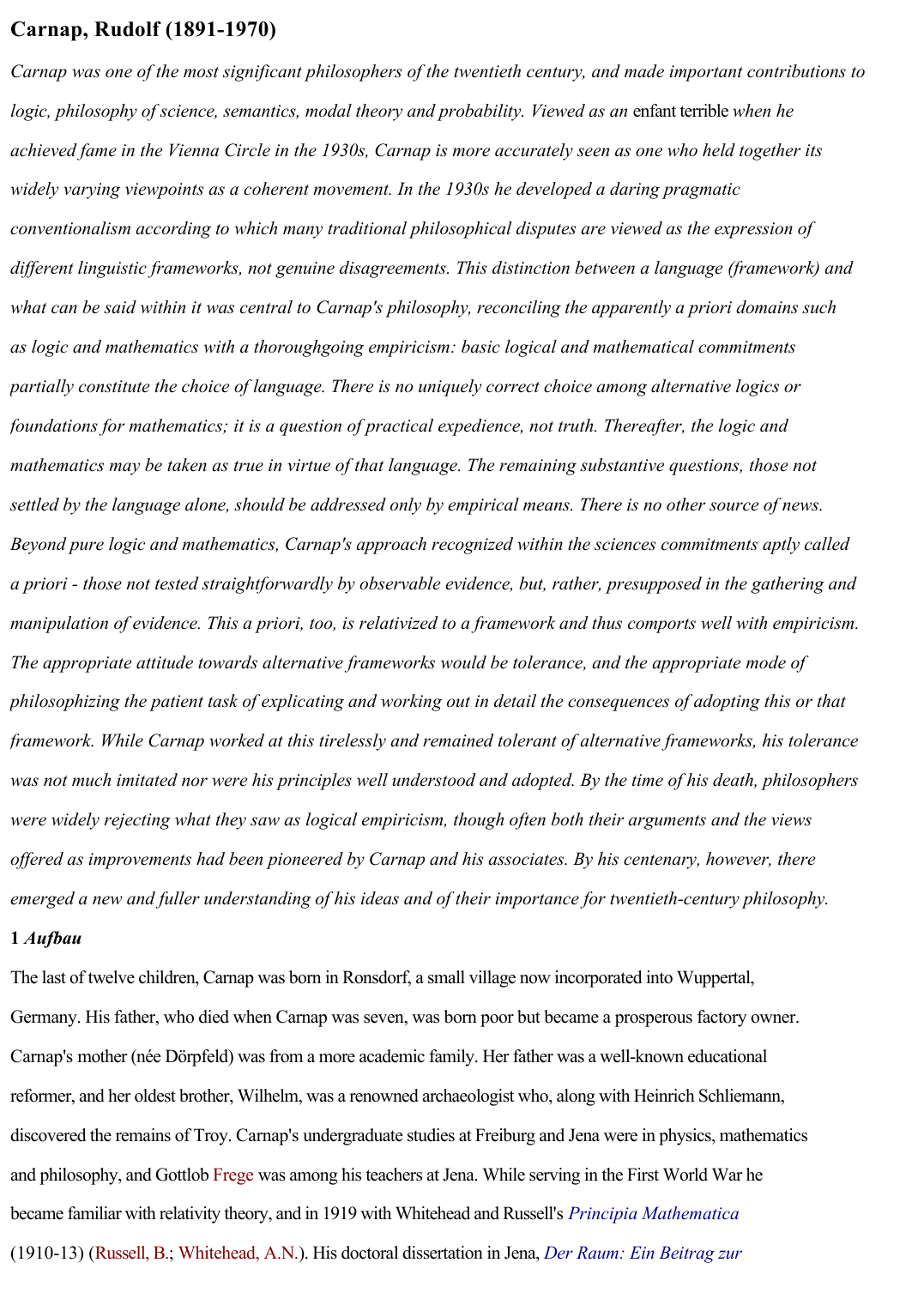Carnap, Rudolf
Publié le 16/05/2020

Extrait du document
«
Carnap, Rudolf (1891-1970)
Carnap was one of the most significant philosophers of the twentieth century, and made important contributions to
logic, philosophy of science, semantics, modal theory and probability.
Viewed as an enfant terrible when he
achieved fame in the Vienna Circle in the 1930s, Carnap is more accurately seen as one who held together its
widely varying viewpoints as a coherent movement.
In the 1930s he developed a daring pragmatic
conventionalism according to which many traditional philosophical disputes are viewed as the expression of
different linguistic frameworks, not genuine disagreements.
This distinction between a language (framework) and
what can be said within it was central to Carnap's philosophy, reconciling the apparently a priori domains such
as logic and mathematics with a thoroughgoing empiricism: basic logical and mathematical commitments
partially constitute the choice of language.
There is no uniquely correct choice among alternative logics or
foundations for mathematics; it is a question of practical expedience, not truth.
Thereafter, the logic and
mathematics may be taken as true in virtue of that language.
The remaining substantive questions, those not
settled by the language alone, should be addressed only by empirical means.
There is no other source of news.
Beyond pure logic and mathematics, Carnap's approach recognized within the sciences commitments aptly called
a priori - those not tested straightforwardly by observable evidence, but, rather, presupposed in the gathering and
manipulation of evidence.
This a priori, too, is relativized to a framework and thus comports well with empiricism.
The appropriate attitude towards alternative frameworks would be tolerance, and the appropriate mode of
philosophizing the patient task of explicating and working out in detail the consequences of adopting this or that
framework.
While Carnap worked at this tirelessly and remained tolerant of alternative frameworks, his tolerance
was not much imitated nor were his principles well understood and adopted.
By the time of his death, philosophers
were widely rejecting what they saw as logical empiricism, though often both their arguments and the views
offered as improvements had been pioneered by Carnap and his associates.
By his centenary, however, there
emerged a new and fuller understanding of his ideas and of their importance for twentieth-century philosophy.
1 Aufbau
The last of twelve children, Carnap was born in Ronsdorf, a small village now incorporated into Wuppertal,
Germany.
His father, who died when Carnap was seven, was born poor but became a prosperous factory owner.
Carnap's mother ( née Dörpfeld ) was from a more academic family.
Her father was a well-known educational
reformer, and her oldest brother, Wilhelm, was a renowned archaeologist who, along with Heinrich Schliemann,
discovered the remains of Troy.
Carnap's undergraduate studies at Freiburg and Jena were in physics, mathematics
and philosophy, and Gottlob Frege was among his teachers at Jena.
While serving in the First World War he
became familiar with relativity theory, and in 1919 with Whitehead and Russell 's Principia Mathematica
(1910-13) ( Russell, B. ; Whitehead, A.N. ).
His doctoral dissertation in Jena, Der Raum: Ein Beitrag zur.
»
↓↓↓ APERÇU DU DOCUMENT ↓↓↓


